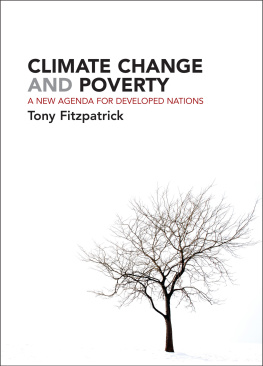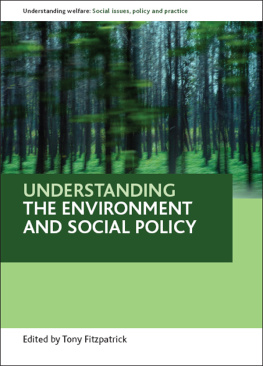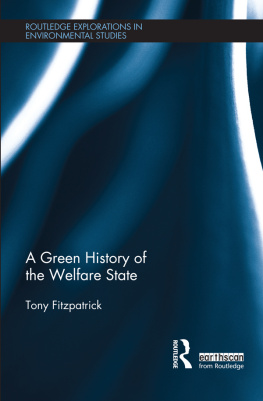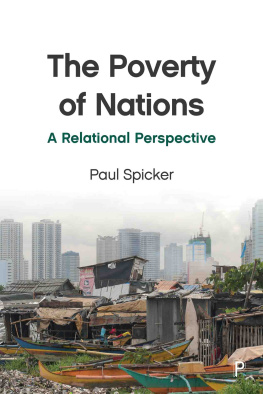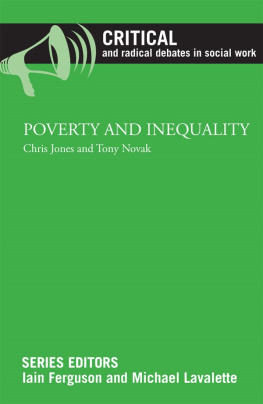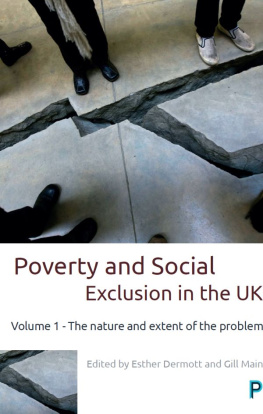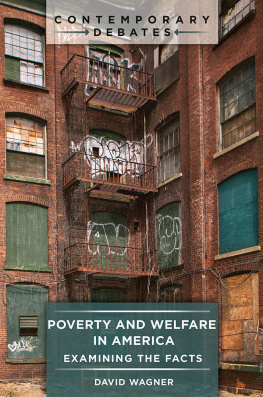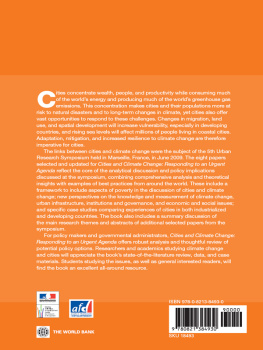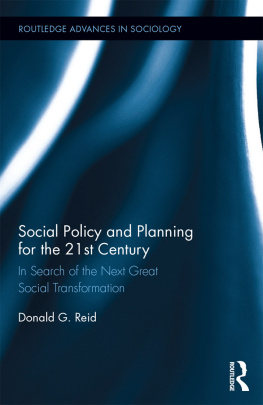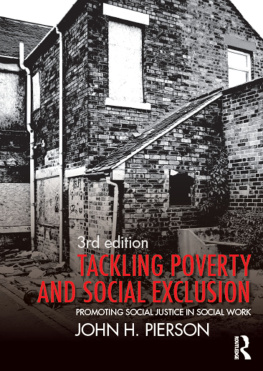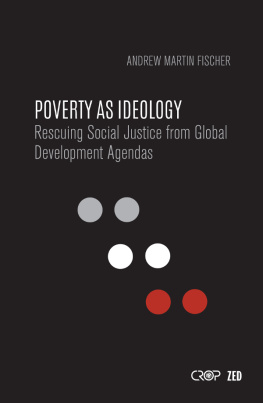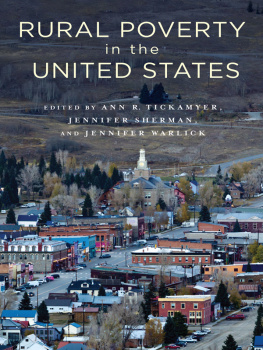CLIMATE CHANGE AND POVERTY
A new agenda for developed nations
Tony Fitzpatrick
First published in Great Britain in 2014 by
Policy Press University of Bristol 6th Floor Howard House Queens Avenue Clifton Bristol BS8 1SD UK Tel +44 (0)117 331 5020 Fax +44 (0)117 331 5367 e-mail
North American office: Policy Press c/o The University of Chicago Press 1427 East 60th Street Chicago, IL 60637, USA t: +1 773 702 7700 f: +1 773-702-9756 e:
Policy Press 2014
British Library Cataloguing in Publication Data
A catalogue record for this book is available from the British Library.
Library of Congress Cataloging-in-Publication Data
A catalog record for this book has been requested.
ISBN 978 1 44731 175 1 epub
ISBN 978 1 44731 176 8 Kindle
The right of Tony Fitzpatrick to be identified as author of this work has been asserted by him in accordance with the 1988 Copyright, Designs and Patents Act.
All rights reserved: no part of this publication may be reproduced, stored in a retrieval system, or transmitted in any form or by any means, electronic, mechanical, photocopying, recording, or otherwise without the prior permission of Policy Press.
The statements and opinions contained within this publication are solely those of the author and not of The University of Bristol or Policy Press. The University of Bristol and Policy Press disclaim responsibility for any injury to persons or property resulting from any material published in this publication.
Policy Press works to counter discrimination on grounds of gender, race, disability, age and sexuality.
Cover design by Andrew Corbett
Front cover: image kindly supplied by www.istock.com
Readers Guide
This book has been optimised for PDA.
Tables may have been presented to accommodate this devices limitations.
Image presentation is limited by this devices limitations.
Poor naked wretches, wheresoeer you are,
That bide the pelting of this pitiless storm,
How shall your houseless heads and unfed sides,
Your looped and windowed raggedness, defend you
From seasons such as these?
William Shakespeare, King Lear , 1606
I was grieved to see a generous, virtuous race of men, who should be considered as the strength and the ornament of their country, torn from their little habitations, and driven out to meet poverty and hardship among strangers. No longer to earn and enjoy the fruits of their labour, they were now going to toil as hirelings under some rigid Master, to flatter the opulent for a precarious meal, and to leave their children the inheritance of want and slavery. All the connexions of kindred were now irreparably broken; their neat gardens and well cultivated fields were left to desolation.
Oliver Goldsmith, The Revolution in Low Life, 1762
His progress in the improvement and exercise of his mental and corporeal faculties has been irregular and various. Yet the experience of four thousand years should enlarge our hopes, and diminish our apprehensions: we cannot determine to what height the human species may aspire in their advances towards perfection; but it may safely be presumed, that no people, unless the face of nature is changed, will relapse into their original barbarism.
Edward Gibbon, The History of the Decline and Fall of the Roman Empire , 177688
Contents
List of figures and tables
Figures
Tables
Abbreviations
| CO | carbon dioxide |
| ECO | Energy Companies Obligation |
| EPC | energy performance certificate |
| EPH | ecological public health |
| GDP | gross domestic product |
| GHGs | greenhouse gases |
| LVT | land value taxation |
| PCAs | personal carbon allowances |
| SoP | Statement of Principles |
Acknowledgements
I am grateful to those who saw this book while it was getting dressed and were diplomatic enough not to giggle. Although they disagreed with some of my arguments, each was invaluable in assisting me to improve them. I am therefore grateful to Hartley Dean, Ian Gough and Carolyn (Caz) Snell. The referees were also helpful in pointing out how and why an earlier draft needed nipping and tucking. I think William Morris once observed that Thomas Carlyle lacked nothing except someone who would sit behind him while he was writing and slap him across the back of the head every 15 minutes. My gratitude, as always, goes to Policy Press too.
Introduction
The armed men reach the top of the hill and look down. Beyond a heath lies the river, grey and putrid, and the city it flows through. This is the end of their journey. Here, they would receive justice, or the powers-that-be would cease to be. What had begun as resistance against the latest tax had escalated into an insurrection that threatened to blow the entire social and economic system apart. Many lives had been lost already. The armed men descend to the heath to make camp. The reckoning will begin tomorrow.
On another hill, 24 miles away, another group traces out the waste ground before them. They are armed with spades and hoes. This land is unclaimed and they wish to demonstrate what a community of plain labourers can achieve in a common effort of common ownership. The times are turbulent. Revolutions are erupting everywhere. Yet they know that their simple act of farming will be seen, and responded to, as perhaps the most revolutionary and threatening of all.
Twenty-seven miles from the second group, but just eight from the first, figures armed with torches march through the night, their faces lit by the flames they have already ignited. They must move quickly if they are to disappear again into the darkness before being discovered. Years of frustration have brought them to this. If they cannot own the land on which they are expected to work, perhaps no one should. With nods to one another, torches aloft, they move towards a barn.
These groups never met. They are, in fact, separated across time. The first event happened at Blackheath in 1381. The Peasants Revolt would be brutally crushed by the boy-King in whom they still had faith and to whom they had come to appeal: Richard II (Dunn, 2002). The second describes the actions of Britains revolution within a revolution within a revolution. The Diggers occupied St Georges Hill in 1649. They would be evicted several months later (Hill, 1991, pp 112-19). The third event happened near Orpington in 1830. The Swing Riots, infamous for the destruction of machinery, started with arson. Those flames would cast the 1830s into a shadow that has never entirely faded, inspiring the architects of the 1834 Poor Law to define as wage-labourers all those who had formally owned the land they worked (Hobsbawm and Rud, 1969).
They are separated by time but united by much else. Other examples could also have been chosen from the history of Britains struggles around the first theme of this book: poverty. The 18th century, for instance, was often shattered with food riots that have now been all but forgotten (Stevenson, 1974; 1979, Chapter 5). Many similar events could be cited, going all the way back to the beginnings of recorded history. Livy (1960) observes how disputes over food and land drove the secession of the plebs in 494 BCE . The political system that resulted characterised the Roman Republic for the next 450 years.

